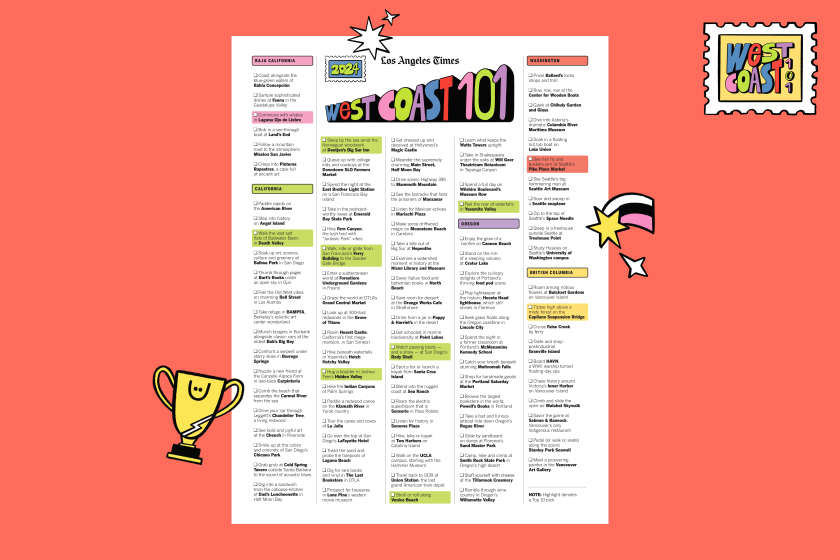Stranded and Alone, She Finds ‘Family’ in Tokyo
Being lonely is being left behind in a foreign country when the rest of your tour group heads for home.
I stood at the Korean Air desk in Tokyo International Airport while the clerk refunded my 2,000 yen departure tax. I wasn’t going anywhere. I had lost my passport.
When I discovered it was missing, I dropped out of the line going through immigration and stepped behind a pillar. Upending my handbag on the floor, I combed through its contents--wallet, cosmetics, notebook, pen. But no passport. Incredible! After 17 years of traveling with a passport, how could this happen to me now?
Our tour manager stood by impatiently. “You can’t board the plane tonight,” he said grimly. “The American Embassy won’t open until Monday. After you get a new passport you’ll have to talk to Korean Air about a flight out. Your luggage is already on the plane and you can’t get it now.”
He stalked away and disappeared beyond the immigration gate while the full weight of my predicament began to sink in.
It was 10 o’clock on a Saturday night. I had $22 in American money (my traveler’s checks were in the lost folder with my passport). In my hand luggage was a change of underwear, a sweater, vitamins and my rain jacket. My total assets.
I sank down on a leather lounge and closed my eyes, breathing a prayer of utter desperation. “Dear God, what do I do now?”
When I opened my eyes, I saw two young faces in the milling crowd that looked faintly familiar.
Glimmer of Hope
Kurt and Julia Hahn had come to the airport to bid goodby to Kurt’s father, a member of our tour group. That morning Bob Hahn had introduced his son and beautiful Japanese daughter-in-law to the people at our breakfast table. The young couple were working in Tokyo where they lived with her parents.
It seemed unlikely that they would remember me, but they were my only hope.
Except for the word toilets in English, all the signs in the vast terminal were in Japanese. I didn’t even know how to find the bus back to the city, where I hoped to find a room at the hotel our party had left just hours ago.
Leaping to my feet, I hurried to intercept them before they reached the door. They looked startled as I introduced myself, but they listened sympathetically as I explained my situation.
Kurt’s calmness was reassuring. “Julia will call the hotel and see if they have found your passport, and if they have a room for you tonight,” he said. It made sense.
But my panic was back when Julia returned. The hotel had not found my passport and they had no vacant rooms that night. What was my next move?
“We aren’t going to leave you until you have a place to stay,” said Kurt, patting my shoulder. “Let’s get on the bus and talk about it on the way back to the city.”
Getting Acquainted
In the next hour we got acquainted. I learned that they had met in the library at San Francisco State University when Kurt asked Julia, an exchange student, for help with his Japanese language studies.
They were married at Kurt’s parents’ home in Hillsborough on the San Francisco peninsula three years ago. Both work as translators in Tokyo.
Halfway to the city the young couple lapsed into Japanese. Kurt apologized and explained: “We would like to take you home with us, but Julia wants to know if you are familiar with Japanese plumbing?”
I assured him I was. Our local guide had tactfully prepared our group for what to expect of Japanese facilities.
“Then there is no problem,” Kurt said. “We’ll call Julia’s mother when we change to the subway and tell her we are bringing company home with us.”
Emiko Utashiro, Julia’s mother, greeted us with a shy smile and a cup of hot tea. She does not speak English, but we beamed at each other while I tried to express my gratitude for her hospitality.
That night I slept on a Japanese futon. My sleep was dreamless under downy quilts. The nightmare was over . . . I was among friends.
The next morning Shoju Utashiro, Julia’s father and a dress designer, presented me with three colorful blouses to stretch my limited wardrobe.
After breakfast I strolled through the quiet neighborhood that seemed more like a village than part of a city of 8.4 million.
Shop owners, who generally live behind or above their places of business, arranged displays of fruit, vegetables and flowers. At a photographer’s shop I had photos made for the new passport I hoped to get on Monday.
Cherry trees that had shown only faint color a few days before were bursting into bowers of pink and white blossoms. That afternoon Kurt, Julia and I attended a Cherry Blossom Festival at a small lake and picnic grounds.
Shoes Lined Up Neatly
Families and social clubs sat on mats with food and drink before them. Shoes were lined up neatly on the perimeter. Radios blared popular music that any American teen-ager would recognize.
A group of older people surrounded a flute player and sang traditional songs to his haunting melodies.
My two guardian angels accompanied me Monday morning to the American Embassy, where the cooperative staff had my new passport ready in two hours. When Kurt went off to work, Julia and I shopped in the Ginza until it was time for me to board the bus to the airport. She was waving when the door closed. I carried a carefully packed box of exquisite silk roses made by Mrs. Utashiro, her parting gift.
Seventeen hours in the air gave me time to reflect on a journey so far from home.
In the Orient I saw palaces of kings and emperors, gold and emerald Buddhas, ancient shrines and temples, splendid silks and jewels.
But memories of those treasures pale when I recall the kindness and concern of four strangers who became my “family” in Japan.
Sign up for The Wild
We’ll help you find the best places to hike, bike and run, as well as the perfect silent spots for meditation and yoga.
You may occasionally receive promotional content from the Los Angeles Times.



